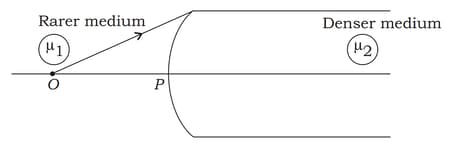Embibe Experts Solutions for Chapter: Ray Optics and Optical Instruments, Exercise 1: Meghalaya-2018
Embibe Experts Physics Solutions for Exercise - Embibe Experts Solutions for Chapter: Ray Optics and Optical Instruments, Exercise 1: Meghalaya-2018
Attempt the free practice questions on Chapter 9: Ray Optics and Optical Instruments, Exercise 1: Meghalaya-2018 with hints and solutions to strengthen your understanding. EMBIBE CHAPTER WISE PREVIOUS YEAR PAPERS FOR PHYSICS solutions are prepared by Experienced Embibe Experts.
Questions from Embibe Experts Solutions for Chapter: Ray Optics and Optical Instruments, Exercise 1: Meghalaya-2018 with Hints & Solutions
You are given two convex lenses of focal lengths and . To make a telescope, which of the two lenses will you use as object lens and which one as eye lens?
Derive an expression for the magnifying power of an astronomical telescope in normal adjustment.
State Snell’s law of refraction. A spherical surface of radius of curvature separates a rarer and a denser medium as shown in the figure below :

Complete the path of the ray of light, showing the formation of a real image. Derive the relation connecting object distance , image distance , radius of curvature and the refractive indices and of the two media.
Find an expression for combined focal length of two thin coaxial convex lenses placed in contact.
With the help of a neat diagram, explain the working of a compound microscope. Obtain an expression for a magnifying power when the final image is formed at least distance of distinct vision.
Show that the effective power of two thin lenses in contact is the sum of the power of each lens.
Why do prefer an objective of large aperture in a telescope?
A small telescope has an objective lens of focal length and an eyepiece of focal length . What is the magnifying power of the telescope?
